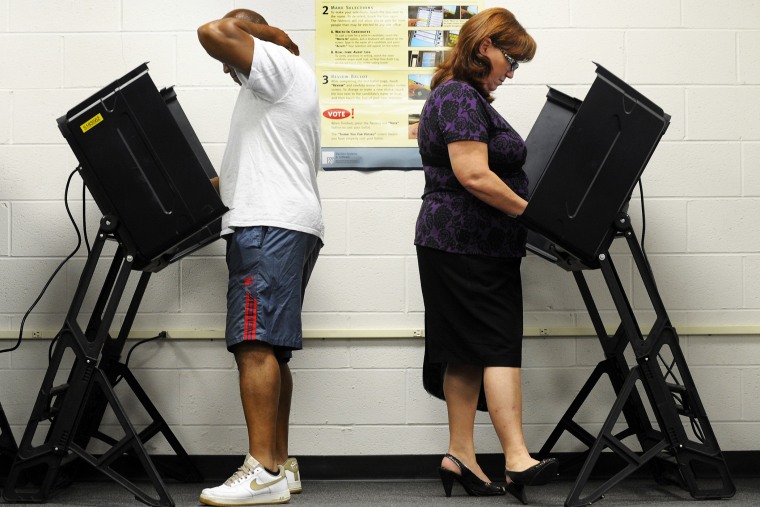North Carolina's hotly contested midterm elections just got a little less voter-friendly.
U.S. District Court Judge Thomas D. Schroeder on Friday ruled that two provisions of North Carolina's controversial voting law -- which challengers argue infringe the democratic process -- will remain in effect until the law goes to trial in 2015. The same judge, meanwhile, also struck a blow against the state, rejecting its request to avoid a full trial.
The ACLU and other civil rights groups are challenging North Carolina's sweeping voting law, specifically taking aim at sections that eliminate a week of early voting and end same-day registration, claiming those provisions violate the U.S. Constitution and the Voting Rights Act of 1965 by placing an undue burden on the right to vote and discriminating against African-American voters.
Since the trial is not set to take place until the summer of 2015, the challengers sought a preliminary injunction from the court to stave off the law's potentially harmful effects during the state's upcoming midterm elections. But a federal judge on Friday denied the ACLU's request, saying the law can remain in effect until the trial.
“This is a victory for North Carolina’s popular law that requires identification to vote,” said Bob Stephens, Chief Legal Counsel to North Carolina Gov. Patrick McCrory, in a statement, adding, “North Carolina is joining a majority of states in common sense protections that preserve the sanctity of the voting booth. Today’s ruling is just more evidence that this law is constitutional – as we have said from the very onset of this process.”
But the ruling is no victory at all for voters, according to the ACLU. North Carolinians use early voting en masse, the civil liberties group said. During the 2012 election, for example, 2.5 million ballots were cast during the early voting period, and more than 70% of African-American voters utilized early voting during the 2008 and 2012 general elections.
"If this law is found unconstitutional, North Carolinians whose voting rights were violated in the midterm election will have lost a critical opportunity to participate in our democratic process," said Dale Ho, director of the ACLU's Voting Rights Project. "While we had hoped the court would recognize this irreparable harm, the ultimate goal is to see these discriminatory measures struck down. We look forward to making our case at full trial, which is something the state had sought to avoid."
Of particular concern to the law's challengers is this fall's pivotal U.S. Senate race in North Carolina, in which Democratic Sen. Kay Hagan will fight against state Republican Rep. Thom Tillis in a contest that could determine which party controls the Senate after the midterm elections. Tillis, the speaker of the North Carolina House, was a major backer of the voting law, and he played a key role in getting it passed last summer.
Zachary Roth contributed to this story.
